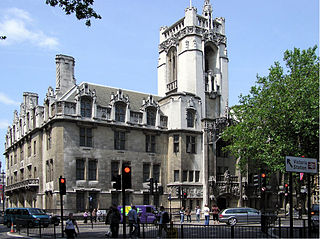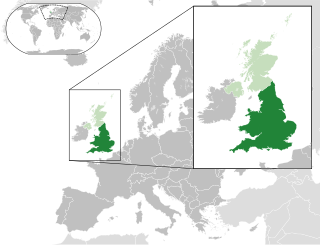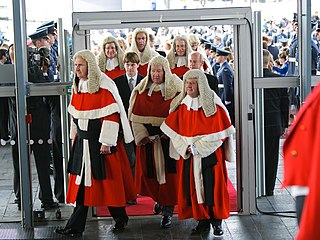
The legislatures of the United Kingdom are derived from a number of different sources. The parliament of the United Kingdom is the supreme legislative body for the United Kingdom and the British overseas territories with Scotland, Wales and Northern Ireland each having their own devolved legislatures. Each of the three major jurisdictions of the United Kingdom has its own laws and legal system.

The United Kingdom has four legal systems, each of which derives from a particular geographical area for a variety of historical reasons: English law, Scots law, Northern Ireland law, and, since 2007, purely Welsh law. However, unlike the other three, Welsh law is not a separate legal system per se, merely the primary and secondary legislation generated by the Senedd, interpreted in accordance with the doctrines of English law and not impacting upon English common law. There is a substantial overlap between these three legal systems and the three legal jurisdictions of the United Kingdom: England and Wales, Scotland, and Northern Ireland. Each legal system defaults to its jurisdiction, each of whose courts further that law through jurisprudence. Choice of which jurisdiction's law to use is possible in private law: for example a company in Edinburgh, Scotland and a company in Belfast, Northern Ireland are free to contract in English law. This is not so in public law, where there are set rules of procedure in each jurisdiction. Overarching these systems is the law of the United Kingdom, also known as United Kingdom law. UK law arises from laws applying to the United Kingdom and/or its citizens as a whole, most obviously constitutional law, but also other areas, for instance tax law.

English law is the common law legal system of England and Wales, comprising mainly criminal law and civil law, each branch having its own courts and procedures.

The Senedd, formally known as the Welsh Parliament in English and Senedd Cymru in Welsh, is the devolved, unicameral legislature of Wales. A democratically elected body, it makes laws for Wales, agrees certain taxes and scrutinises the Welsh Government. It is a bilingual institution, with both Welsh and English being the official languages of its business. From its creation in May 1999 until May 2020, the Senedd was known as the National Assembly for Wales.

England and Wales is a legal jurisdiction covering England and Wales, two of the four parts of the United Kingdom. England and Wales forms the constitutional successor to the former Kingdom of England and follows a single legal system, known as English law.

The Welsh Office was a department in the Government of the United Kingdom with responsibilities for Wales. It was established in April 1965 to execute government policy in Wales, and was headed by the Secretary of State for Wales, a post which had been created in October 1964. It was disbanded on 1 July 1999 when most of its powers were transferred to the National Assembly for Wales, with some powers transferred to the Office of the Secretary of State for Wales, a department popularly known as the Wales Office.

The Welsh Government is the devolved government of Wales. The government consists of ministers, who attend cabinet meetings, and deputy ministers who do not, and also of a counsel general. It is led by the first minister, usually the leader of the largest party in the Senedd, who selects ministers and deputy ministers with the approval of the Senedd. The government is responsible for tabling policy in devolved areas for consideration by the Senedd and implementing policy that has been approved by it.

The First Minister of Wales is the Leader of the Welsh Government. The First Minister chairs the Welsh Cabinet and is primarily responsible for the formulation, development and presentation of Welsh Government policy. Additional functions of the First Minister include promoting and representing Wales in an official capacity, at home and abroad, and responsibility for constitutional affairs, as they relate to devolution and the Welsh Government.
Parliamentary counsel are lawyers who prepare legislation that it is proposed to pass into law. The terms Parliamentary drafter, Parliamentary draftsman, legislative drafting officer and legislative counsel are also widely used. These terms are used in relation to the United Kingdom parliament in Westminster, and other parliaments and assemblies based on the Westminster system. The official title, and organisation, of the parliamentary counsel varies between legislatures. For example, those who draft government legislation for the UK parliament form the Parliamentary Counsel Office while the Scottish Government's Parliamentary Counsel Office drafts legislation for the Scottish Parliament, the Office of the Legislative Counsel drafts legislation for the Northern Ireland Assembly and the (Welsh) Office of the Legislative Counsel performs the same role in relation to Senedd Cymru. In the Republic of Ireland, there is an Office of the Parliamentary Counsel to Government. In Australia, each state, territory and the federal government has an Office of Parliamentary Counsel.
Politics in Wales forms a distinctive polity in the wider politics of the United Kingdom, with Wales as one of the four constituent countries of the United Kingdom (UK).

In the United Kingdom reserved matters and excepted matters are the areas of public policy where the Parliament of the United Kingdom has retained the exclusive power to legislate in Scotland, Wales and Northern Ireland.

The Government of Wales Act 2006 is an Act of the Parliament of the United Kingdom that reformed the then-National Assembly for Wales and allows further powers to be granted to it more easily. The Act creates a system of government with a separate executive drawn from and accountable to the legislature.

Welsh law is the primary and secondary legislation generated by the Senedd, using devolved authority granted in the Government of Wales Act 2006 and in effect since May 2007. Each piece of Welsh legislation is known as an Act of Senedd Cymru. The first Welsh legislation to be proposed was the NHS Redress (Wales) Measure 2008. This was the first time in almost 500 years that Wales has had its own laws, since Cyfraith Hywel, a version of Celtic law, was abolished and replaced by English law through the Laws in Wales Acts, enacted between 1535 and 1542 during the reign of King Henry VIII.
The Counsel General for Wales is the Welsh Government's Law Officer, which means the government's chief legal adviser and representative in the courts. In addition to these "lawyer" roles the Counsel General also works to uphold the rule of law and integrity of the legal community in Wales, and has a number of important specific statutory functions, some of which are to be exercised independently of government and in the public interest.

The Senedd Commission is the corporate body for the Senedd of Wales. The Commission is responsible for ensuring the property, staff and services are provided for the Senedd. The Commission consists of the Presiding Officer and four Members from different political parties, who each have different portfolios of work. The Commission is supported by staff in the Commission and Support Service. Prior to 2020, the body was known as the National Assembly for Wales Commission.

A Measure of the National Assembly for Wales is primary legislation in Wales that is a category lower than an Act of Parliament. In the case of contemporary Welsh law, the difference with Acts is that the competence to pass Measures is subject to 'LCOs' or Legislative Competence Order, which transfers powers to the Assembly by amending Schedule 5 of the Government of Wales Act 2006.

In the United Kingdom an Act of Parliament is primary legislation passed by the Parliament of the United Kingdom.

In Wales, an Act of Senedd Cymru, or informally an Act of the Senedd, is primary legislation that can be made by the Senedd under part 4 of the Government of Wales Act 2006. Prior to 6 May 2020 any legislation was formally known as an Act of the National Assembly for Wales or informally, an Act of the Assembly.

In the United Kingdom, devolution is the Parliament of the United Kingdom's statutory granting of a greater level of self-government to the Scottish Parliament, the Senedd, the Northern Ireland Assembly and the London Assembly and to their associated executive bodies the Scottish Government, the Welsh Government, the Northern Ireland Executive and in England, the Greater London Authority and combined authorities.

Theodore Huckle is a Welsh barrister. He served as the first independent professional Counsel General for Wales, the statutory Law Officer to the Welsh Government, during the governmental term of the 4th Assembly/Senedd. Upon nomination by the First Minister, his appointment was approved by the Senedd and formally made by the Queen on 21 July 2011, although he had been acting Counsel General from his birthday on 27 May 2011.